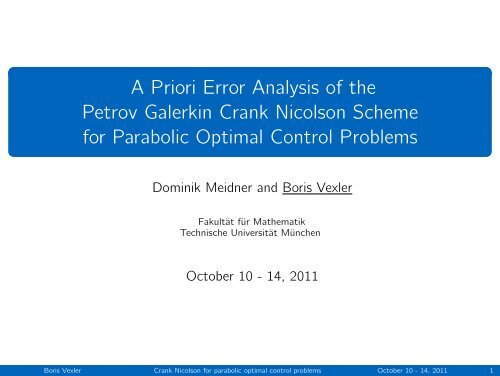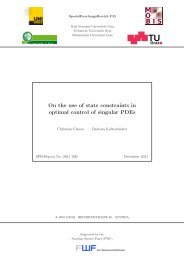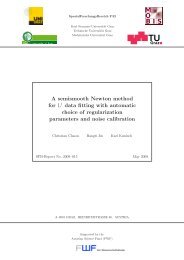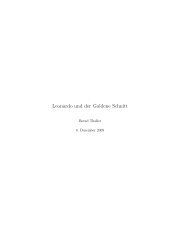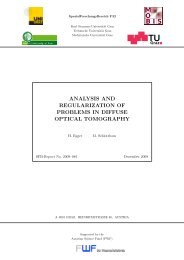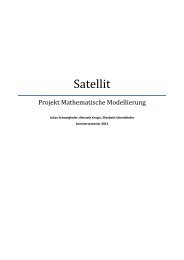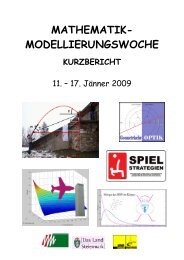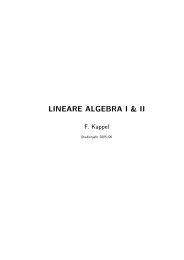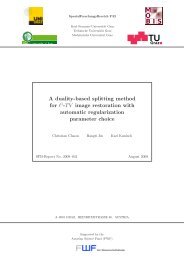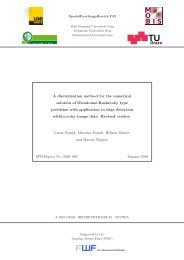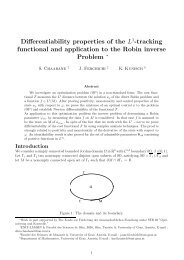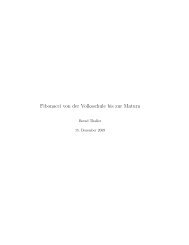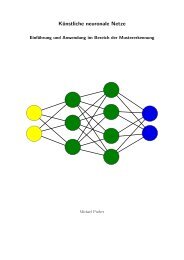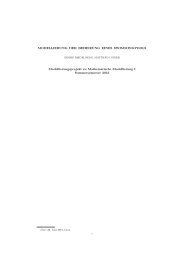A Priori Error Analysis of the Petrov Galerkin Crank Nicolson ...
A Priori Error Analysis of the Petrov Galerkin Crank Nicolson ...
A Priori Error Analysis of the Petrov Galerkin Crank Nicolson ...
You also want an ePaper? Increase the reach of your titles
YUMPU automatically turns print PDFs into web optimized ePapers that Google loves.
A <strong>Priori</strong> <strong>Error</strong> <strong>Analysis</strong> <strong>of</strong> <strong>the</strong><br />
<strong>Petrov</strong> <strong>Galerkin</strong> <strong>Crank</strong> <strong>Nicolson</strong> Scheme<br />
for Parabolic Optimal Control Problems<br />
Dominik Meidner and Boris Vexler<br />
Fakultät für Ma<strong>the</strong>matik<br />
Technische Universität München<br />
October 10 - 14, 2011<br />
Boris Vexler <strong>Crank</strong> <strong>Nicolson</strong> for parabolic optimal control problems October 10 - 14, 2011 1
Optimal control problem<br />
Cost functional<br />
Minimize J(q, u) = 1 2<br />
State equation<br />
∫ T<br />
0<br />
∫<br />
Ω(u(t, x) − û(t, x)) 2 dx dt + α 2<br />
∂ t u − ∆u = f + Gq in (0, T ) × Ω,<br />
u = 0<br />
u = u 0<br />
on (0, T ) × ∂Ω,<br />
in {0} × Ω<br />
with G : Q = L 2 (0, T ; R D ) → L 2 (0, T ; H 1 (Ω)) and<br />
(Gq)(t, x) = ∑ D<br />
i=1 q i(t)g i (x), g i ∈ V = H 1 0 (Ω).<br />
Control constraints<br />
q a ≤ q(t) ≤ q b a. e. in (0, T ).<br />
∫ T<br />
0<br />
|q(t)| 2 dt<br />
Boris Vexler <strong>Crank</strong> <strong>Nicolson</strong> for parabolic optimal control problems October 10 - 14, 2011 2
Optimal control problem<br />
Cost functional<br />
Minimize J(q, u) = 1 2<br />
State equation<br />
∫ T<br />
0<br />
∫<br />
Ω(u(t, x) − û(t, x)) 2 dx dt + α 2<br />
∂ t u − ∆u = f + Gq in (0, T ) × Ω,<br />
u = 0<br />
u = u 0<br />
on (0, T ) × ∂Ω,<br />
in {0} × Ω<br />
with G : Q = L 2 (0, T ; R D ) → L 2 (0, T ; H 1 (Ω)) and<br />
(Gq)(t, x) = ∑ D<br />
i=1 q i(t)g i (x), g i ∈ V = H 1 0 (Ω).<br />
Control constraints<br />
q a ≤ q(t) ≤ q b a. e. in (0, T ).<br />
∫ T<br />
0<br />
|q(t)| 2 dt<br />
Boris Vexler <strong>Crank</strong> <strong>Nicolson</strong> for parabolic optimal control problems October 10 - 14, 2011 2
Optimal control problem<br />
Cost functional<br />
Minimize J(q, u) = 1 2<br />
State equation<br />
∫ T<br />
0<br />
∫<br />
Ω(u(t, x) − û(t, x)) 2 dx dt + α 2<br />
∂ t u − ∆u = f + Gq in (0, T ) × Ω,<br />
u = 0<br />
u = u 0<br />
on (0, T ) × ∂Ω,<br />
in {0} × Ω<br />
with G : Q = L 2 (0, T ; R D ) → L 2 (0, T ; H 1 (Ω)) and<br />
(Gq)(t, x) = ∑ D<br />
i=1 q i(t)g i (x), g i ∈ V = H 1 0 (Ω).<br />
Control constraints<br />
q a ≤ q(t) ≤ q b a. e. in (0, T ).<br />
∫ T<br />
0<br />
|q(t)| 2 dt<br />
Boris Vexler <strong>Crank</strong> <strong>Nicolson</strong> for parabolic optimal control problems October 10 - 14, 2011 2
A priori error analysis<br />
Temporal discretization <strong>of</strong> <strong>the</strong> state<br />
→ discretization parameter k<br />
Spatial discretization <strong>of</strong> <strong>the</strong> state<br />
→ discretization parameter h<br />
Treatment <strong>of</strong> <strong>the</strong> control<br />
→ Goal:<br />
<strong>Error</strong> estimate<br />
‖¯q − ˜q kh ‖ Q = O(k 2 + h 2 ).<br />
→ optimal control ¯q is not smooth (due to control constraints)<br />
→ <strong>Crank</strong> <strong>Nicolson</strong> scheme is <strong>of</strong> second order in k<br />
→ Adjoint scheme<br />
Boris Vexler <strong>Crank</strong> <strong>Nicolson</strong> for parabolic optimal control problems October 10 - 14, 2011 3
A priori error analysis<br />
Temporal discretization <strong>of</strong> <strong>the</strong> state<br />
→ discretization parameter k<br />
Spatial discretization <strong>of</strong> <strong>the</strong> state<br />
→ discretization parameter h<br />
Treatment <strong>of</strong> <strong>the</strong> control<br />
→ Goal:<br />
<strong>Error</strong> estimate<br />
‖¯q − ˜q kh ‖ Q = O(k 2 + h 2 ).<br />
→ optimal control ¯q is not smooth (due to control constraints)<br />
→ <strong>Crank</strong> <strong>Nicolson</strong> scheme is <strong>of</strong> second order in k<br />
→ Adjoint scheme<br />
Boris Vexler <strong>Crank</strong> <strong>Nicolson</strong> for parabolic optimal control problems October 10 - 14, 2011 3
A priori error analysis<br />
Temporal discretization <strong>of</strong> <strong>the</strong> state<br />
→ discretization parameter k<br />
Spatial discretization <strong>of</strong> <strong>the</strong> state<br />
→ discretization parameter h<br />
Treatment <strong>of</strong> <strong>the</strong> control<br />
→ Goal:<br />
<strong>Error</strong> estimate<br />
‖¯q − ˜q kh ‖ Q = O(k 2 + h 2 ).<br />
→ optimal control ¯q is not smooth (due to control constraints)<br />
→ <strong>Crank</strong> <strong>Nicolson</strong> scheme is <strong>of</strong> second order in k<br />
→ Adjoint scheme<br />
Boris Vexler <strong>Crank</strong> <strong>Nicolson</strong> for parabolic optimal control problems October 10 - 14, 2011 3
A priori error analysis<br />
Temporal discretization <strong>of</strong> <strong>the</strong> state<br />
→ discretization parameter k<br />
Spatial discretization <strong>of</strong> <strong>the</strong> state<br />
→ discretization parameter h<br />
Treatment <strong>of</strong> <strong>the</strong> control<br />
→ Goal:<br />
<strong>Error</strong> estimate<br />
‖¯q − ˜q kh ‖ Q = O(k 2 + h 2 ).<br />
→ optimal control ¯q is not smooth (due to control constraints)<br />
→ <strong>Crank</strong> <strong>Nicolson</strong> scheme is <strong>of</strong> second order in k<br />
→ Adjoint scheme<br />
Boris Vexler <strong>Crank</strong> <strong>Nicolson</strong> for parabolic optimal control problems October 10 - 14, 2011 3
A priori error analysis<br />
Temporal discretization <strong>of</strong> <strong>the</strong> state<br />
→ discretization parameter k<br />
Spatial discretization <strong>of</strong> <strong>the</strong> state<br />
→ discretization parameter h<br />
Treatment <strong>of</strong> <strong>the</strong> control<br />
→ Goal:<br />
<strong>Error</strong> estimate<br />
‖¯q − ˜q kh ‖ Q = O(k 2 + h 2 ).<br />
→ optimal control ¯q is not smooth (due to control constraints)<br />
→ <strong>Crank</strong> <strong>Nicolson</strong> scheme is <strong>of</strong> second order in k<br />
→ Adjoint scheme<br />
Boris Vexler <strong>Crank</strong> <strong>Nicolson</strong> for parabolic optimal control problems October 10 - 14, 2011 3
Existing literature<br />
<strong>Error</strong> estimates for parabolic problems without constraints:<br />
Gunzburger, Hou, Hinze, Deckelnick, Chrysafinos, Win<strong>the</strong>r, . . .<br />
Apel and Flaig 2011 (<strong>Crank</strong>-<strong>Nicolson</strong>)<br />
<strong>Error</strong> estimates for parabolic problems with control constraints<br />
Lasiecka and Malanowski 1977/78, Malanowski 1981<br />
Rösch 2004<br />
Meidner and Vexler 2008<br />
Neitzel and Vexler 2011 (semilinear)<br />
Meidner and Vexler 2011 (<strong>Petrov</strong>-<strong>Galerkin</strong>-<strong>Crank</strong>-<strong>Nicolson</strong>) → O(k 2 + h 2 )<br />
<strong>Error</strong> estimates for parabolic problems with state constraints<br />
Deckelnick and Hinze 2010<br />
Meidner, Rannacher, and Vexler 2010<br />
Boris Vexler <strong>Crank</strong> <strong>Nicolson</strong> for parabolic optimal control problems October 10 - 14, 2011 4
Existing literature<br />
<strong>Error</strong> estimates for parabolic problems without constraints:<br />
Gunzburger, Hou, Hinze, Deckelnick, Chrysafinos, Win<strong>the</strong>r, . . .<br />
Apel and Flaig 2011 (<strong>Crank</strong>-<strong>Nicolson</strong>)<br />
<strong>Error</strong> estimates for parabolic problems with control constraints<br />
Lasiecka and Malanowski 1977/78, Malanowski 1981<br />
Rösch 2004<br />
Meidner and Vexler 2008<br />
Neitzel and Vexler 2011 (semilinear)<br />
Meidner and Vexler 2011 (<strong>Petrov</strong>-<strong>Galerkin</strong>-<strong>Crank</strong>-<strong>Nicolson</strong>) → O(k 2 + h 2 )<br />
<strong>Error</strong> estimates for parabolic problems with state constraints<br />
Deckelnick and Hinze 2010<br />
Meidner, Rannacher, and Vexler 2010<br />
Boris Vexler <strong>Crank</strong> <strong>Nicolson</strong> for parabolic optimal control problems October 10 - 14, 2011 4
Existing literature<br />
<strong>Error</strong> estimates for parabolic problems without constraints:<br />
Gunzburger, Hou, Hinze, Deckelnick, Chrysafinos, Win<strong>the</strong>r, . . .<br />
Apel and Flaig 2011 (<strong>Crank</strong>-<strong>Nicolson</strong>)<br />
<strong>Error</strong> estimates for parabolic problems with control constraints<br />
Lasiecka and Malanowski 1977/78, Malanowski 1981<br />
Rösch 2004<br />
Meidner and Vexler 2008<br />
Neitzel and Vexler 2011 (semilinear)<br />
Meidner and Vexler 2011 (<strong>Petrov</strong>-<strong>Galerkin</strong>-<strong>Crank</strong>-<strong>Nicolson</strong>) → O(k 2 + h 2 )<br />
<strong>Error</strong> estimates for parabolic problems with state constraints<br />
Deckelnick and Hinze 2010<br />
Meidner, Rannacher, and Vexler 2010<br />
Boris Vexler <strong>Crank</strong> <strong>Nicolson</strong> for parabolic optimal control problems October 10 - 14, 2011 4
Existing literature<br />
<strong>Error</strong> estimates for parabolic problems without constraints:<br />
Gunzburger, Hou, Hinze, Deckelnick, Chrysafinos, Win<strong>the</strong>r, . . .<br />
Apel and Flaig 2011 (<strong>Crank</strong>-<strong>Nicolson</strong>)<br />
<strong>Error</strong> estimates for parabolic problems with control constraints<br />
Lasiecka and Malanowski 1977/78, Malanowski 1981<br />
Rösch 2004<br />
Meidner and Vexler 2008<br />
Neitzel and Vexler 2011 (semilinear)<br />
Meidner and Vexler 2011 (<strong>Petrov</strong>-<strong>Galerkin</strong>-<strong>Crank</strong>-<strong>Nicolson</strong>) → O(k 2 + h 2 )<br />
<strong>Error</strong> estimates for parabolic problems with state constraints<br />
Deckelnick and Hinze 2010<br />
Meidner, Rannacher, and Vexler 2010<br />
Boris Vexler <strong>Crank</strong> <strong>Nicolson</strong> for parabolic optimal control problems October 10 - 14, 2011 4
Optimality system and regularity<br />
Optimality system<br />
∂ t ū − ∆ū = f + G ¯q, u(0) = u 0<br />
−∂ t ¯z − ∆¯z = ū − û, z(T ) = 0<br />
(α¯q + G ∗¯z, δq − ¯q) ≥ 0<br />
∀δq ∈ Q ad<br />
→ ¯q = P Qad<br />
(<br />
−<br />
1<br />
α G ∗¯z ) with <strong>the</strong> pointwise projection P Qad : Q → Q ad<br />
Assumption 1<br />
Regularity<br />
Ω is polygonal and convex<br />
f , û ∈ H 1 (0, T ; L 2 (Ω)), f (0), û(T ) ∈ H 1 0 (Ω) u 0 , ∆u 0 ∈ H 1 0 (Ω)<br />
¯q ∈ W 1,∞ (0, T ; R D ),<br />
ū, ¯z ∈ H 1 (0, T ; H 2 (Ω)) ∩ H 2 (0, T ; L 2 (Ω))<br />
Boris Vexler <strong>Crank</strong> <strong>Nicolson</strong> for parabolic optimal control problems October 10 - 14, 2011 5
Optimality system and regularity<br />
Optimality system<br />
∂ t ū − ∆ū = f + G ¯q, u(0) = u 0<br />
−∂ t ¯z − ∆¯z = ū − û, z(T ) = 0<br />
(α¯q + G ∗¯z, δq − ¯q) ≥ 0<br />
∀δq ∈ Q ad<br />
→ ¯q = P Qad<br />
(<br />
−<br />
1<br />
α G ∗¯z ) with <strong>the</strong> pointwise projection P Qad : Q → Q ad<br />
Assumption 1<br />
Regularity<br />
Ω is polygonal and convex<br />
f , û ∈ H 1 (0, T ; L 2 (Ω)), f (0), û(T ) ∈ H 1 0 (Ω) u 0 , ∆u 0 ∈ H 1 0 (Ω)<br />
¯q ∈ W 1,∞ (0, T ; R D ),<br />
ū, ¯z ∈ H 1 (0, T ; H 2 (Ω)) ∩ H 2 (0, T ; L 2 (Ω))<br />
Boris Vexler <strong>Crank</strong> <strong>Nicolson</strong> for parabolic optimal control problems October 10 - 14, 2011 5
Optimality system and regularity<br />
Optimality system<br />
∂ t ū − ∆ū = f + G ¯q, u(0) = u 0<br />
−∂ t ¯z − ∆¯z = ū − û, z(T ) = 0<br />
(α¯q + G ∗¯z, δq − ¯q) ≥ 0<br />
∀δq ∈ Q ad<br />
→ ¯q = P Qad<br />
(<br />
−<br />
1<br />
α G ∗¯z ) with <strong>the</strong> pointwise projection P Qad : Q → Q ad<br />
Assumption 1<br />
Regularity<br />
Ω is polygonal and convex<br />
f , û ∈ H 1 (0, T ; L 2 (Ω)), f (0), û(T ) ∈ H 1 0 (Ω) u 0 , ∆u 0 ∈ H 1 0 (Ω)<br />
¯q ∈ W 1,∞ (0, T ; R D ),<br />
ū, ¯z ∈ H 1 (0, T ; H 2 (Ω)) ∩ H 2 (0, T ; L 2 (Ω))<br />
Boris Vexler <strong>Crank</strong> <strong>Nicolson</strong> for parabolic optimal control problems October 10 - 14, 2011 5
Temporal discretization<br />
→ cG(1) <strong>Petrov</strong>-<strong>Galerkin</strong> method<br />
Partitioning <strong>of</strong> <strong>the</strong> time interval Ī = [0, T ]:<br />
Ī = {0} ∪ I 1 ∪ I 2 ∪ · · · ∪ I M<br />
with subintervals I m = (t m−1, t m] <strong>of</strong> size k m and time points<br />
Ansatz space (continuous)<br />
X 1 k =<br />
0 = t 0 < t 1 < · · · < t M−1 < t M = T<br />
{<br />
v k ∈ C(Ī , V ) ∣ ∣∣<br />
vk<br />
∣ ∣<br />
I m<br />
∈ P 1(I m, V ), m = 1, 2, . . . , M<br />
Test space (discontinuous)<br />
{<br />
˜X k 0 = v k ∈ L 2 ∣ }<br />
(I , V ) ∣ v k ∈ P<br />
I m 0(I m, V ), m = 1, 2, . . . , M, v k (0) ∈ V<br />
}<br />
,<br />
Boris Vexler <strong>Crank</strong> <strong>Nicolson</strong> for parabolic optimal control problems October 10 - 14, 2011 6
Temporal discretization<br />
→ cG(1) <strong>Petrov</strong>-<strong>Galerkin</strong> method<br />
Partitioning <strong>of</strong> <strong>the</strong> time interval Ī = [0, T ]:<br />
Ī = {0} ∪ I 1 ∪ I 2 ∪ · · · ∪ I M<br />
with subintervals I m = (t m−1, t m] <strong>of</strong> size k m and time points<br />
Ansatz space (continuous)<br />
X 1 k =<br />
0 = t 0 < t 1 < · · · < t M−1 < t M = T<br />
{<br />
v k ∈ C(Ī , V ) ∣ ∣∣<br />
vk<br />
∣ ∣<br />
I m<br />
∈ P 1(I m, V ), m = 1, 2, . . . , M<br />
Test space (discontinuous)<br />
{<br />
˜X k 0 = v k ∈ L 2 ∣ }<br />
(I , V ) ∣ v k ∈ P<br />
I m 0(I m, V ), m = 1, 2, . . . , M, v k (0) ∈ V<br />
}<br />
,<br />
Boris Vexler <strong>Crank</strong> <strong>Nicolson</strong> for parabolic optimal control problems October 10 - 14, 2011 6
Temporal discretization<br />
→ cG(1) <strong>Petrov</strong>-<strong>Galerkin</strong> method<br />
Partitioning <strong>of</strong> <strong>the</strong> time interval Ī = [0, T ]:<br />
Ī = {0} ∪ I 1 ∪ I 2 ∪ · · · ∪ I M<br />
with subintervals I m = (t m−1, t m] <strong>of</strong> size k m and time points<br />
Ansatz space (continuous)<br />
X 1 k =<br />
0 = t 0 < t 1 < · · · < t M−1 < t M = T<br />
{<br />
v k ∈ C(Ī , V ) ∣ ∣∣<br />
vk<br />
∣ ∣<br />
I m<br />
∈ P 1(I m, V ), m = 1, 2, . . . , M<br />
Test space (discontinuous)<br />
{<br />
˜X k 0 = v k ∈ L 2 ∣ }<br />
(I , V ) ∣ v k ∈ P<br />
I m 0(I m, V ), m = 1, 2, . . . , M, v k (0) ∈ V<br />
}<br />
,<br />
Boris Vexler <strong>Crank</strong> <strong>Nicolson</strong> for parabolic optimal control problems October 10 - 14, 2011 6
Temporal discretization<br />
Bilinear form:<br />
B(u k , φ) := (∂ t u k , φ) I ×Ω + (∇u k , ∇φ) I ×Ω + (u k,0 , φ − 0 ).<br />
Temporal discretization <strong>of</strong> <strong>the</strong> state:<br />
u k ∈ Xk 1 : B(u k , φ) = (f + Gq, φ) I ×Ω + (u 0 , φ − 0 ) ∀φ ∈ ˜X k 0 .<br />
Temporal discretization <strong>of</strong> <strong>the</strong> adjoint state:<br />
z k ∈ ˜X k 0 : B(φ, z k ) = (u k − û, φ) I ×Ω ∀φ ∈ Xk 1 .<br />
→ Discrete adjoint state is piecewise constant.<br />
Boris Vexler <strong>Crank</strong> <strong>Nicolson</strong> for parabolic optimal control problems October 10 - 14, 2011 7
Temporal discretization<br />
Bilinear form:<br />
B(u k , φ) := (∂ t u k , φ) I ×Ω + (∇u k , ∇φ) I ×Ω + (u k,0 , φ − 0 ).<br />
Temporal discretization <strong>of</strong> <strong>the</strong> state:<br />
u k ∈ Xk 1 : B(u k , φ) = (f + Gq, φ) I ×Ω + (u 0 , φ − 0 ) ∀φ ∈ ˜X k 0 .<br />
Temporal discretization <strong>of</strong> <strong>the</strong> adjoint state:<br />
z k ∈ ˜X k 0 : B(φ, z k ) = (u k − û, φ) I ×Ω ∀φ ∈ Xk 1 .<br />
→ Discrete adjoint state is piecewise constant.<br />
Boris Vexler <strong>Crank</strong> <strong>Nicolson</strong> for parabolic optimal control problems October 10 - 14, 2011 7
Temporal discretization<br />
Bilinear form:<br />
B(u k , φ) := (∂ t u k , φ) I ×Ω + (∇u k , ∇φ) I ×Ω + (u k,0 , φ − 0 ).<br />
Temporal discretization <strong>of</strong> <strong>the</strong> state:<br />
u k ∈ Xk 1 : B(u k , φ) = (f + Gq, φ) I ×Ω + (u 0 , φ − 0 ) ∀φ ∈ ˜X k 0 .<br />
Temporal discretization <strong>of</strong> <strong>the</strong> adjoint state:<br />
z k ∈ ˜X k 0 : B(φ, z k ) = (u k − û, φ) I ×Ω ∀φ ∈ Xk 1 .<br />
→ Discrete adjoint state is piecewise constant.<br />
Boris Vexler <strong>Crank</strong> <strong>Nicolson</strong> for parabolic optimal control problems October 10 - 14, 2011 7
Temporal discretization<br />
Bilinear form:<br />
B(u k , φ) := (∂ t u k , φ) I ×Ω + (∇u k , ∇φ) I ×Ω + (u k,0 , φ − 0 ).<br />
Temporal discretization <strong>of</strong> <strong>the</strong> state:<br />
u k ∈ Xk 1 : B(u k , φ) = (f + Gq, φ) I ×Ω + (u 0 , φ − 0 ) ∀φ ∈ ˜X k 0 .<br />
Temporal discretization <strong>of</strong> <strong>the</strong> adjoint state:<br />
z k ∈ ˜X k 0 : B(φ, z k ) = (u k − û, φ) I ×Ω ∀φ ∈ Xk 1 .<br />
→ Discrete adjoint state is piecewise constant.<br />
Boris Vexler <strong>Crank</strong> <strong>Nicolson</strong> for parabolic optimal control problems October 10 - 14, 2011 7
Temporal discretization<br />
cG(1) discretization <strong>of</strong> <strong>the</strong> state is a variant <strong>of</strong> <strong>the</strong> <strong>Crank</strong> <strong>Nicolson</strong> scheme<br />
→ second order convergence<br />
Consistent discretization <strong>of</strong> <strong>the</strong> adjoint state → piecewise constants<br />
→ only first order convergence expected<br />
→ Variational discretization (no control discretization)<br />
→ only first order convergence<br />
‖¯q − ¯q k ‖ Q = O(k).<br />
→ How to achieve O(k 2 ) <br />
Boris Vexler <strong>Crank</strong> <strong>Nicolson</strong> for parabolic optimal control problems October 10 - 14, 2011 8
Temporal discretization<br />
cG(1) discretization <strong>of</strong> <strong>the</strong> state is a variant <strong>of</strong> <strong>the</strong> <strong>Crank</strong> <strong>Nicolson</strong> scheme<br />
→ second order convergence<br />
Consistent discretization <strong>of</strong> <strong>the</strong> adjoint state → piecewise constants<br />
→ only first order convergence expected<br />
→ Variational discretization (no control discretization)<br />
→ only first order convergence<br />
‖¯q − ¯q k ‖ Q = O(k).<br />
→ How to achieve O(k 2 ) <br />
Boris Vexler <strong>Crank</strong> <strong>Nicolson</strong> for parabolic optimal control problems October 10 - 14, 2011 8
Temporal discretization<br />
cG(1) discretization <strong>of</strong> <strong>the</strong> state is a variant <strong>of</strong> <strong>the</strong> <strong>Crank</strong> <strong>Nicolson</strong> scheme<br />
→ second order convergence<br />
Consistent discretization <strong>of</strong> <strong>the</strong> adjoint state → piecewise constants<br />
→ only first order convergence expected<br />
→ Variational discretization (no control discretization)<br />
→ only first order convergence<br />
‖¯q − ¯q k ‖ Q = O(k).<br />
→ How to achieve O(k 2 ) <br />
Boris Vexler <strong>Crank</strong> <strong>Nicolson</strong> for parabolic optimal control problems October 10 - 14, 2011 8
Temporal discretization<br />
cG(1) discretization <strong>of</strong> <strong>the</strong> state is a variant <strong>of</strong> <strong>the</strong> <strong>Crank</strong> <strong>Nicolson</strong> scheme<br />
→ second order convergence<br />
Consistent discretization <strong>of</strong> <strong>the</strong> adjoint state → piecewise constants<br />
→ only first order convergence expected<br />
→ Variational discretization (no control discretization)<br />
→ only first order convergence<br />
‖¯q − ¯q k ‖ Q = O(k).<br />
→ How to achieve O(k 2 ) <br />
Boris Vexler <strong>Crank</strong> <strong>Nicolson</strong> for parabolic optimal control problems October 10 - 14, 2011 8
Temporal discretization<br />
Adjoint discretization<br />
z k<br />
Piecewise linear interpolation at <strong>the</strong> midpoints<br />
→ Superconvergence result (Meidner & Vexler 2011)<br />
‖z − π k z k ‖ L2 (I ×Ω) = O(k 2 )<br />
Boris Vexler <strong>Crank</strong> <strong>Nicolson</strong> for parabolic optimal control problems October 10 - 14, 2011 9
Temporal discretization<br />
Adjoint discretization<br />
z k<br />
Piecewise linear interpolation at <strong>the</strong> midpoints<br />
z k<br />
π k z k<br />
→ Superconvergence result (Meidner & Vexler 2011)<br />
‖z − π k z k ‖ L2 (I ×Ω) = O(k 2 )<br />
Boris Vexler <strong>Crank</strong> <strong>Nicolson</strong> for parabolic optimal control problems October 10 - 14, 2011 9
Temporal discretization<br />
Adjoint discretization<br />
z k<br />
Piecewise linear interpolation at <strong>the</strong> midpoints<br />
z k<br />
π k z k<br />
→ Superconvergence result (Meidner & Vexler 2011)<br />
‖z − π k z k ‖ L2 (I ×Ω) = O(k 2 )<br />
Boris Vexler <strong>Crank</strong> <strong>Nicolson</strong> for parabolic optimal control problems October 10 - 14, 2011 9
Superconvergence result<br />
Theorem (Meidner & Vexler 2011)<br />
Let z be solution <strong>of</strong><br />
−∂ t z − ∆z = g, z(T ) = 0<br />
with g ∈ H 1 (0, T ; L 2 (Ω)), g(T ) ∈ H 1 0 (Ω) and z k ∈ ˜X 0 k<br />
B(φ, z k ) = (g, φ) I ×Ω ∀φ ∈ X 1 k .<br />
be defined by<br />
Then <strong>the</strong>re holds<br />
‖z − π k z k ‖ L2 (I ×Ω) ≤ c k ( )<br />
2 ‖∂t 2 z‖ L2 (I ×Ω) + ‖∂ t ∆z‖ L2 (I ×Ω)<br />
Boris Vexler <strong>Crank</strong> <strong>Nicolson</strong> for parabolic optimal control problems October 10 - 14, 2011 10
Superconvergence result: Pro<strong>of</strong><br />
Step 1: Semidiscrete stability estimates<br />
→ diagonal testing is not possible!<br />
‖∂ t v k ‖ I ×Ω + ‖P k ∆v k ‖ I ×Ω + ‖∇v k ‖ I ×Ω ≤ c‖f ‖ I ×Ω<br />
with L 2 -Projection P k : L 2 (0, T ; L 2 (Ω)) → ˜X<br />
k 0.<br />
Step 2: Supercloseness for <strong>the</strong> midpoint interpolation<br />
→ duality arguments & stability estimates (step 1)<br />
‖Π k z − z k ‖ L2 (I ×Ω) ≤ c k ( )<br />
2 ‖∂t 2 z‖ L2 (I ×Ω) + ‖∂ t ∆z‖ L2 (I ×Ω)<br />
Step 3: Stability <strong>of</strong> π k in L 2 (I × Ω) for semidiscrete functions<br />
→ π k is in general not stable w.r.t. L 2 (I × Ω), but<br />
‖π k y k ‖ I ×Ω ≤ c‖y k ‖ I ×Ω<br />
∀y k ∈ ˜X 0 k<br />
Boris Vexler <strong>Crank</strong> <strong>Nicolson</strong> for parabolic optimal control problems October 10 - 14, 2011 11
Superconvergence result: Pro<strong>of</strong><br />
Step 1: Semidiscrete stability estimates<br />
→ diagonal testing is not possible!<br />
‖∂ t v k ‖ I ×Ω + ‖P k ∆v k ‖ I ×Ω + ‖∇v k ‖ I ×Ω ≤ c‖f ‖ I ×Ω<br />
with L 2 -Projection P k : L 2 (0, T ; L 2 (Ω)) → ˜X<br />
k 0.<br />
Step 2: Supercloseness for <strong>the</strong> midpoint interpolation<br />
→ duality arguments & stability estimates (step 1)<br />
‖Π k z − z k ‖ L2 (I ×Ω) ≤ c k ( )<br />
2 ‖∂t 2 z‖ L2 (I ×Ω) + ‖∂ t ∆z‖ L2 (I ×Ω)<br />
Step 3: Stability <strong>of</strong> π k in L 2 (I × Ω) for semidiscrete functions<br />
→ π k is in general not stable w.r.t. L 2 (I × Ω), but<br />
‖π k y k ‖ I ×Ω ≤ c‖y k ‖ I ×Ω<br />
∀y k ∈ ˜X 0 k<br />
Boris Vexler <strong>Crank</strong> <strong>Nicolson</strong> for parabolic optimal control problems October 10 - 14, 2011 11
Superconvergence result: Pro<strong>of</strong><br />
Step 1: Semidiscrete stability estimates<br />
→ diagonal testing is not possible!<br />
‖∂ t v k ‖ I ×Ω + ‖P k ∆v k ‖ I ×Ω + ‖∇v k ‖ I ×Ω ≤ c‖f ‖ I ×Ω<br />
with L 2 -Projection P k : L 2 (0, T ; L 2 (Ω)) → ˜X<br />
k 0.<br />
Step 2: Supercloseness for <strong>the</strong> midpoint interpolation<br />
→ duality arguments & stability estimates (step 1)<br />
‖Π k z − z k ‖ L2 (I ×Ω) ≤ c k ( )<br />
2 ‖∂t 2 z‖ L2 (I ×Ω) + ‖∂ t ∆z‖ L2 (I ×Ω)<br />
Step 3: Stability <strong>of</strong> π k in L 2 (I × Ω) for semidiscrete functions<br />
→ π k is in general not stable w.r.t. L 2 (I × Ω), but<br />
‖π k y k ‖ I ×Ω ≤ c‖y k ‖ I ×Ω<br />
∀y k ∈ ˜X 0 k<br />
Boris Vexler <strong>Crank</strong> <strong>Nicolson</strong> for parabolic optimal control problems October 10 - 14, 2011 11
Postprocessing strategy<br />
State discretization<br />
u k<br />
Boris Vexler <strong>Crank</strong> <strong>Nicolson</strong> for parabolic optimal control problems October 10 - 14, 2011 12
Postprocessing strategy<br />
State discretization<br />
u k<br />
Adjoint and control discretization<br />
z k<br />
Boris Vexler <strong>Crank</strong> <strong>Nicolson</strong> for parabolic optimal control problems October 10 - 14, 2011 12
Postprocessing strategy<br />
State discretization<br />
u k<br />
Adjoint discretization and interpolation<br />
z k<br />
π k z k<br />
Boris Vexler <strong>Crank</strong> <strong>Nicolson</strong> for parabolic optimal control problems October 10 - 14, 2011 12
Postprocessing strategy<br />
Intermediate step: − 1 α π kG ∗ z k<br />
−α −1 π k G ∗ z k<br />
Postprocessed ˜q k = P Qad (− 1 α π kG ∗ z k )<br />
→ cf. C. Meyer & A. Rösch 2004.<br />
Boris Vexler <strong>Crank</strong> <strong>Nicolson</strong> for parabolic optimal control problems October 10 - 14, 2011 13
Postprocessing strategy<br />
Intermediate step: − 1 α π kG ∗ z k<br />
−α −1 π k G ∗ z k<br />
Postprocessed ˜q k = P Qad (− 1 α π kG ∗ z k )<br />
˜q k<br />
−α −1 π k G ∗ z k<br />
→ cf. C. Meyer & A. Rösch 2004.<br />
Boris Vexler <strong>Crank</strong> <strong>Nicolson</strong> for parabolic optimal control problems October 10 - 14, 2011 13
Postprocessing strategy<br />
Assumption 2<br />
The boundaries <strong>of</strong> <strong>the</strong> active sets<br />
A i = { t ∈ [0, T ] | q i (t) = q a,i or q i (t) = q b,i } , i = 1, 2, . . . , D<br />
consist <strong>of</strong> a finite number <strong>of</strong> points.<br />
Theorem<br />
Let Assumptions 1 and 2 be fulfilled. Let ˜q k be defined as<br />
(<br />
˜q k = P Qad − 1 )<br />
α π kG ∗¯z k .<br />
Then <strong>the</strong>re holds:<br />
‖¯q − ˜q k ‖ Q = O(k 2 ).<br />
◮ D. Meidner and B. Vexler.<br />
A priori error analysis <strong>of</strong> <strong>the</strong> <strong>Petrov</strong> <strong>Galerkin</strong> <strong>Crank</strong> <strong>Nicolson</strong> scheme for parabolic optimal control<br />
problems.<br />
SIAM J. Control Optim., accepted (2011)<br />
Boris Vexler <strong>Crank</strong> <strong>Nicolson</strong> for parabolic optimal control problems October 10 - 14, 2011 14
Postprocessing strategy<br />
Assumption 2<br />
The boundaries <strong>of</strong> <strong>the</strong> active sets<br />
A i = { t ∈ [0, T ] | q i (t) = q a,i or q i (t) = q b,i } , i = 1, 2, . . . , D<br />
consist <strong>of</strong> a finite number <strong>of</strong> points.<br />
Theorem<br />
Let Assumptions 1 and 2 be fulfilled. Let ˜q k be defined as<br />
(<br />
˜q k = P Qad − 1 )<br />
α π kG ∗¯z k .<br />
Then <strong>the</strong>re holds:<br />
‖¯q − ˜q k ‖ Q = O(k 2 ).<br />
◮ D. Meidner and B. Vexler.<br />
A priori error analysis <strong>of</strong> <strong>the</strong> <strong>Petrov</strong> <strong>Galerkin</strong> <strong>Crank</strong> <strong>Nicolson</strong> scheme for parabolic optimal control<br />
problems.<br />
SIAM J. Control Optim., accepted (2011)<br />
Boris Vexler <strong>Crank</strong> <strong>Nicolson</strong> for parabolic optimal control problems October 10 - 14, 2011 14
Spatial discretization<br />
→ Linear or bilinear finite elements for both state and <strong>the</strong> adjoint state<br />
Ansatz space (continuous in time)<br />
{<br />
Xkh 1 = v kh ∈ C(Ī , V h)<br />
∣ v k<br />
∣<br />
∣Im<br />
∈ P 1 (I m , V h ), m = 1, 2, . . . , M<br />
Test space (discontinuous in time)<br />
{<br />
˜X kh 0 = v kh ∈ L 2 ∣ }<br />
(I , V h ) ∣ v ∣Im kh ∈ P 0 (I m , V h ), m = 1, 2, . . . , M, v kh (0) ∈ V h<br />
Space-time discretization <strong>of</strong> <strong>the</strong> state:<br />
u kh ∈ X 1 kh : B(u kh , φ) = (f + Gq, φ) I ×Ω + (u 0 , φ − 0 ) ∀φ ∈ ˜X 0 kh.<br />
Space-time discretization <strong>of</strong> <strong>the</strong> adjoint state:<br />
z kh ∈ ˜X 0 kh : B(φ, z kh ) = (u kh − û, φ) I ×Ω ∀φ ∈ X 1 kh.<br />
}<br />
,<br />
Boris Vexler <strong>Crank</strong> <strong>Nicolson</strong> for parabolic optimal control problems October 10 - 14, 2011 15
Spatial discretization<br />
→ Linear or bilinear finite elements for both state and <strong>the</strong> adjoint state<br />
Ansatz space (continuous in time)<br />
{<br />
Xkh 1 = v kh ∈ C(Ī , V h)<br />
∣ v k<br />
∣<br />
∣Im<br />
∈ P 1 (I m , V h ), m = 1, 2, . . . , M<br />
Test space (discontinuous in time)<br />
{<br />
˜X kh 0 = v kh ∈ L 2 ∣ }<br />
(I , V h ) ∣ v ∣Im kh ∈ P 0 (I m , V h ), m = 1, 2, . . . , M, v kh (0) ∈ V h<br />
Space-time discretization <strong>of</strong> <strong>the</strong> state:<br />
u kh ∈ X 1 kh : B(u kh , φ) = (f + Gq, φ) I ×Ω + (u 0 , φ − 0 ) ∀φ ∈ ˜X 0 kh.<br />
Space-time discretization <strong>of</strong> <strong>the</strong> adjoint state:<br />
z kh ∈ ˜X 0 kh : B(φ, z kh ) = (u kh − û, φ) I ×Ω ∀φ ∈ X 1 kh.<br />
}<br />
,<br />
Boris Vexler <strong>Crank</strong> <strong>Nicolson</strong> for parabolic optimal control problems October 10 - 14, 2011 15
Spatial discretization<br />
→ Linear or bilinear finite elements for both state and <strong>the</strong> adjoint state<br />
Ansatz space (continuous in time)<br />
{<br />
Xkh 1 = v kh ∈ C(Ī , V h)<br />
∣ v k<br />
∣<br />
∣Im<br />
∈ P 1 (I m , V h ), m = 1, 2, . . . , M<br />
Test space (discontinuous in time)<br />
{<br />
˜X kh 0 = v kh ∈ L 2 ∣ }<br />
(I , V h ) ∣ v ∣Im kh ∈ P 0 (I m , V h ), m = 1, 2, . . . , M, v kh (0) ∈ V h<br />
Space-time discretization <strong>of</strong> <strong>the</strong> state:<br />
u kh ∈ X 1 kh : B(u kh , φ) = (f + Gq, φ) I ×Ω + (u 0 , φ − 0 ) ∀φ ∈ ˜X 0 kh.<br />
Space-time discretization <strong>of</strong> <strong>the</strong> adjoint state:<br />
z kh ∈ ˜X 0 kh : B(φ, z kh ) = (u kh − û, φ) I ×Ω ∀φ ∈ X 1 kh.<br />
}<br />
,<br />
Boris Vexler <strong>Crank</strong> <strong>Nicolson</strong> for parabolic optimal control problems October 10 - 14, 2011 15
Spatial discretization<br />
→ Linear or bilinear finite elements for both state and <strong>the</strong> adjoint state<br />
Ansatz space (continuous in time)<br />
{<br />
Xkh 1 = v kh ∈ C(Ī , V h)<br />
∣ v k<br />
∣<br />
∣Im<br />
∈ P 1 (I m , V h ), m = 1, 2, . . . , M<br />
Test space (discontinuous in time)<br />
{<br />
˜X kh 0 = v kh ∈ L 2 ∣ }<br />
(I , V h ) ∣ v ∣Im kh ∈ P 0 (I m , V h ), m = 1, 2, . . . , M, v kh (0) ∈ V h<br />
Space-time discretization <strong>of</strong> <strong>the</strong> state:<br />
u kh ∈ X 1 kh : B(u kh , φ) = (f + Gq, φ) I ×Ω + (u 0 , φ − 0 ) ∀φ ∈ ˜X 0 kh.<br />
Space-time discretization <strong>of</strong> <strong>the</strong> adjoint state:<br />
z kh ∈ ˜X 0 kh : B(φ, z kh ) = (u kh − û, φ) I ×Ω ∀φ ∈ X 1 kh.<br />
}<br />
,<br />
Boris Vexler <strong>Crank</strong> <strong>Nicolson</strong> for parabolic optimal control problems October 10 - 14, 2011 15
Spatial discretization<br />
→ Linear or bilinear finite elements for both state and <strong>the</strong> adjoint state<br />
Ansatz space (continuous in time)<br />
{<br />
Xkh 1 = v kh ∈ C(Ī , V h)<br />
∣ v k<br />
∣<br />
∣Im<br />
∈ P 1 (I m , V h ), m = 1, 2, . . . , M<br />
Test space (discontinuous in time)<br />
{<br />
˜X kh 0 = v kh ∈ L 2 ∣ }<br />
(I , V h ) ∣ v ∣Im kh ∈ P 0 (I m , V h ), m = 1, 2, . . . , M, v kh (0) ∈ V h<br />
Space-time discretization <strong>of</strong> <strong>the</strong> state:<br />
u kh ∈ X 1 kh : B(u kh , φ) = (f + Gq, φ) I ×Ω + (u 0 , φ − 0 ) ∀φ ∈ ˜X 0 kh.<br />
Space-time discretization <strong>of</strong> <strong>the</strong> adjoint state:<br />
z kh ∈ ˜X 0 kh : B(φ, z kh ) = (u kh − û, φ) I ×Ω ∀φ ∈ X 1 kh.<br />
}<br />
,<br />
Boris Vexler <strong>Crank</strong> <strong>Nicolson</strong> for parabolic optimal control problems October 10 - 14, 2011 15
Postprocessing strategy<br />
Theorem<br />
Let Assumptions 1 and 2 be fulfilled. Let ˜q kh be defined as<br />
(<br />
˜q kh = P Qad − 1 )<br />
α π kG ∗¯z kh .<br />
Then <strong>the</strong>re holds:<br />
‖¯q − ˜q kh ‖ Q = O(k 2 + h 2 ).<br />
◮ D. Meidner and B. Vexler.<br />
A priori error analysis <strong>of</strong> <strong>the</strong> <strong>Petrov</strong> <strong>Galerkin</strong> <strong>Crank</strong> <strong>Nicolson</strong> scheme for parabolic optimal control<br />
problems.<br />
SIAM J. Control Optim., accepted (2011)<br />
Boris Vexler <strong>Crank</strong> <strong>Nicolson</strong> for parabolic optimal control problems October 10 - 14, 2011 16
Numerical example: temporal error<br />
Problem with known exact solution<br />
(<br />
¯q(t) := P Qad − π4 {<br />
exp(aπ 2 t) − exp(aπ 2 T ) }) ,<br />
4<br />
ū(t, x 1 , x 2 ) :=<br />
−1<br />
2 + a π2 w a (t, x 1 , x 2 ),<br />
¯z(t, x 1 , x 2 ) := w a (t, x 1 , x 2 ) − w a (T , x 1 , x 2 ).<br />
with<br />
w a (t, x 1 , x 2 ) := exp(aπ 2 t) sin(πx 1 ) sin(πx 2 ),<br />
q a = −70, q b = −1, a = − √ 5, T = 0.1<br />
Boris Vexler <strong>Crank</strong> <strong>Nicolson</strong> for parabolic optimal control problems October 10 - 14, 2011 17
Numerical example: temporal error<br />
|¯q − ¯q kh | I<br />
|¯q − ˜q kh | I<br />
O(k)<br />
O(k 2 )<br />
10 0 10 0 10 1 10 2 10 3<br />
10 −1<br />
10 −2<br />
M<br />
Boris Vexler <strong>Crank</strong> <strong>Nicolson</strong> for parabolic optimal control problems October 10 - 14, 2011 18
Numerical example: spatial error<br />
|¯q − ¯q kh | I<br />
|¯q − ˜q kh | I<br />
O(h 2 )<br />
10 0<br />
10 −1<br />
10 −2<br />
10 −3<br />
10 1 10 2 10 3 10 4 10 −4<br />
N<br />
Boris Vexler <strong>Crank</strong> <strong>Nicolson</strong> for parabolic optimal control problems October 10 - 14, 2011 19
Conclusions<br />
→ cG(1) <strong>Petrov</strong>-<strong>Galerkin</strong> discretization → <strong>Crank</strong> <strong>Nicolson</strong> scheme<br />
→ consistent discretization <strong>of</strong> <strong>the</strong> adjoint state<br />
→ second order convergence for <strong>the</strong> postprocessed control<br />
◮ D. Meidner and B. Vexler.<br />
A priori error analysis <strong>of</strong> <strong>the</strong> <strong>Petrov</strong> <strong>Galerkin</strong> <strong>Crank</strong> <strong>Nicolson</strong> scheme for parabolic optimal control<br />
problems.<br />
SIAM J. Control Optim., accepted (2011)<br />
Boris Vexler <strong>Crank</strong> <strong>Nicolson</strong> for parabolic optimal control problems October 10 - 14, 2011 20


